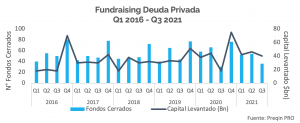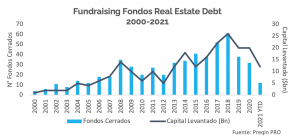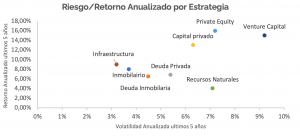
As central banks gradually withdraw their support, Private Debt managers are gearing up to be able to step in to fill the gap.
In the aggregate, fundraising by private debt funds has been increasing in recent years, mainly due to the illiquidity premium offered by this type of funds and also due to the increase in the correlation of traditional assets, which makes alternative assets a good option to diversify portfolios. Thus, the level of fundraising by Private Debt during the first half of the year 2021 has had an increase never seen before[1], reaching a fundraising of US$87 bn during that period and a creation of 108 funds across the planet.
On the other hand, two main reasons can be identified as to why the environment for the collection of this type of assets will continue to increase. First, credit needs will increase as economies gradually return to normal. The second reason is that there are no clear signs that yields on government instruments will change significantly, as most economists believe that the high inflationary levels currently being seen are a transitory phenomenon.

What role does US Real Estate Debt play in all this?
Since 2018, in the US, it would appear that both fundraising by these types of funds and the creation of new funds has been slowing. During 2018, 61 real estate debt funds were created and in the aggregate, they raised a total of US$26bn, peaking in both fundraising and fund creation. Then, during 2019 and 2020, an average of US$20bn was raised annually and 38 and 32 funds were created respectively, causing the average size per fund to grow from US$692MM to US$742MM during 2020. However, we see how large global managers have launched large funds in recent years, which shows the value that investors see in this asset class.

In particular, the differentiating value provided by this type of asset is low volatility. Despite having lower returns, they have less variation compared to the broader universe of private equity assets. This, coupled with the low correlation of private debt assets with traditional assets, represents a great opportunity to diversify portfolios in search of lower volatility.

According to one of the world's leading alternative asset managers, Oaktree, there are several factors that are necessary to be successful in the real estate private debt universe. The first one refers to the need to have a significant ability to access capital in order to finance sophisticated and high quality businesses. On the other hand, they talk about having a strong network of contacts in the industry - with banks, brokers and sponsors - which is key to have access to a differentiating dealflow and to realize investment projects that are attractive to investors.
In the current scenario of uncertainty that the country is going through, and the volatility of the domestic market, a foreign investment alternative is very attractive. In addition, if we invest in strategies that have been presenting attractive risk-adjusted returns, such as private debt and real estate funds, we can diversify our portfolios and obtain better returns.
Fynsa AGF
[1] Preqin data